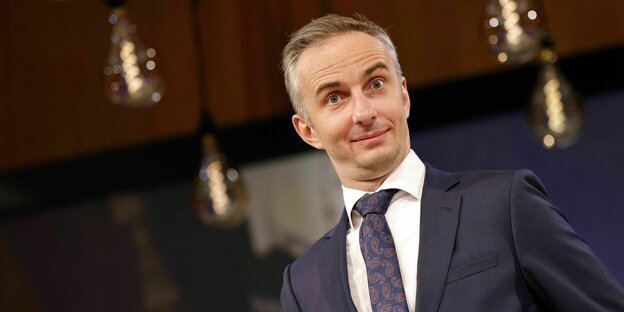A beekeeper from Meißen can advertise his honey with the image and name of Jan Böhmermann. This was decided by the Dresden Regional Court.

David Imker defeated Goliath Böhmermann Photo: imago
“Whoever distributes it must also be able to receive it!” The old boxer's rule applies even to a merchant boss and a federal sharp-tongued man like Jan Böhmermann. The Dresden Regional Court ruled on Thursday that one can satirize with the same media if one feels denounced by it. He rejected the television presenter and satirist's request for a court order to be filed against a beekeeper from Meißen. He defended himself with a parody advertising campaign against the suggestion in the ZDF's “Magazin-Royale” that he practiced so-called “bee washing”. A conciliation meeting held in mid-January failed.
In the magazine issued on November 3, 2023, Böhmermann spoke about greenwashing among German companies, that is, deceiving partners and customers through the appearance of ecological and sustainable businesses. Beekeepers were also targeted. Böhmermann and the editorial team claimed that they too were engaged in “bee washing”, exploiting the ignorance of buyers and making a business out of the death of bees. For example, the logo of the organic beekeeping company “MyHoney” from Meißen, Saxony, appeared for eight seconds. CEO Rico Heinzig maintains around 200 bee colonies and offers bee sponsorship for schools and businesses.
Heinzig felt misunderstood, but did not immediately go to the lawyer, but instead defended himself with his own cabaret act. Just over two weeks later, he and his three employees set up a stand with 150 jars of honey at an Edeka branch in Dresden, labeled “HONEY for washing bees.” Behind it, a fake poster showed Böhmermann with his typical finger-pointing gesture from the television show.
Point to one of these glasses. Above it says: “Recommends a leading expert on bees and beetles.” These honey jars can also be ordered online. There's also a QR code on each that you can use to access a specially configured YouTube channel. There, beekeeper Heinzig explains and presents his point of view on the bee problem.
Rare joy at court
“The request for a precautionary measure was admissible, but unfounded,” explained judge Heike Kremz. “Mr. Böhmermann has to accept the reactions of those who feel attracted to him,” was the conclusion of the three-quarter-hour reasoning to hand down the sentence. The judge, who was evidently not without humor, largely maintained her composure during this time. In the large jury room, occupied by numerous journalists, on several occasions during her conference there was a rare joy in this judicial environment.
Neither the plaintiff nor the defendant appeared for the verdict. Beekeeper lawyer Markus Hoffmann from Dresden had reported earlier at the conciliation meeting that his client was “shocked” and wanted to defend herself “with an exaggerated countersatire” and draw attention to the issue. Böhmermann's lawyer Torben Düsing highlighted personal rights. His client does not want “people to advertise with his face and his name,” and Böhmermann generally does not advertise any products.
Judge Heike Kremz addressed this personal right in detail based on Article 23 of the Art Copyright Act. In principle there is the right to one's own image. But a photograph can also be published without the consent of the interested party, if it refers to a historical event and the legitimate interests of the person portrayed are not violated. That is the case here.
When in doubt, for freedom
The context clearly shows the irony. “It would also be a contradiction to the program's accusations if Jan Böhmermann suddenly praised a product of the attacked person,” the judge used her logic. Her justification repeatedly refers to a “satirical expression of opinion.” When weighing interests, “interpretations that allow for satire should be preferred.” “In dubio pro libertate”: in doubt about freedom, Heike Kremz summarized her opinion.
The financial interests of beekeeper Heinzig, who had already reported calls from concerned customers, played only a marginal role. Both parties now have four weeks to appeal to the Higher Regional Court in Dresden. The moral value of the litigation is probably now higher than the material value, set at 15,000 euros.